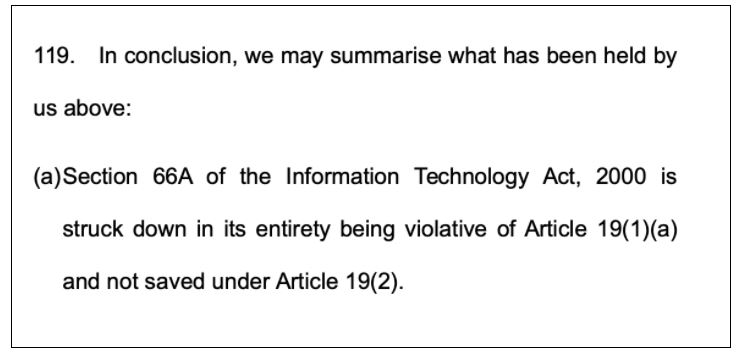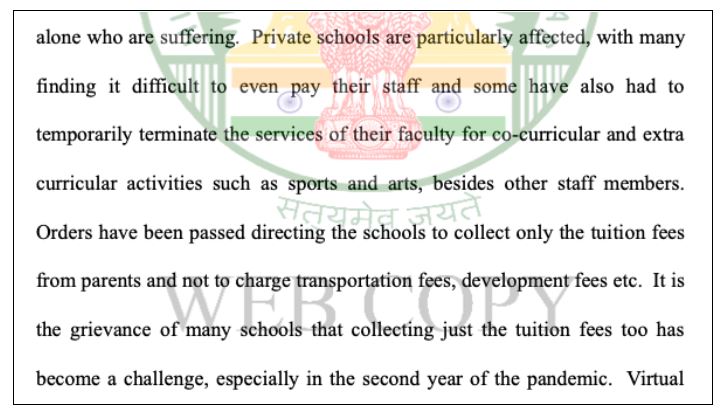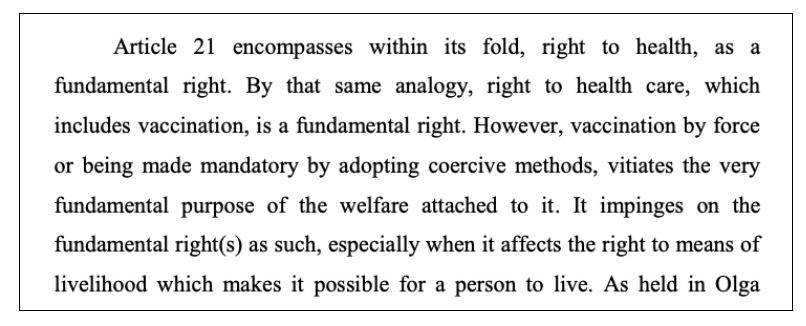In this roundup of court judgements, we look at Constitutional Courts’ remarks & directions on continued use of Section 66A of IT Act, right to decent burial/cremation, collection of fees by private unaided schools, and vaccine hesitancy.
Supreme Court: Issues notice to States, UTs, High Court Registrars on plea against the continued use of 66A of IT Act
The Supreme Court issued notice to States, Union Territories and Registrar of High Courts seeking various directions and guidelines against the FIRs under the provision of Section 66A struck down by Shreya Singhal case judgement.
The court was hearing a plea filed by Peoples Union for Civil Liberties (PUCL) seeking various directions and guidelines against the FIRs under struck down the provision of Section 66A in Shreya Singhal case judgement. Section 66A of the Information Technology Act, 2000 gave the government powers to arrest and imprison an individual for allegedly “offensive and menacing” online posts, or for the purposes of causing annoyance, inconvenience, etc. It prescribed the punishment for sending such messages through a computer or any other communication device like a mobile phone or a tablet, and a conviction could fetch a maximum of three years in jail. In the Shreya Singhal judgment, a bench of Justices J Chelameswar and RF Nariman struck down Section 66A as violative of Articles 14 and 19(1)(a) of the Constitution. The judgment held the provision to be vague, overboard and creating a chilling effect on free speech.

On 05 July 2021, the apex court had expressed shock at the practice of police still registering FIRs under Section 66A of the Information Technology Act, which was struck down by the top court in the 2015 judgment in the Shreya Singhal case.
The PUCL was seeking directions to the Union of India, through the NCRB (National Crime Records Bureau) or any other agency, to collect data of all FIRs registered invoking Section 66A of the IT Act after it had been struck down. Further, data has also been sought of the pendency of cases in the District Courts and High Courts throughout the country where proceedings under Section 66A are continuing in violation of the Supreme Court’s judgment.
Pursuant to the order dated 05 July 2021, the Centre filed a counter-affidavit before the Supreme Court stating that Police and Police orders are state subjects, therefore the primary responsibility to ensure implementation of Shreya Singhal’s judgement which had struck down Section 66A of the IT Act lies with the State. The affidavit has also provided details of efforts made by the Ministry of IT and Home Affairs to disseminate knowledge about the judgement, along with details of pending prosecutions across the country under Section 66A of the IT Act.
The Centre informed the Supreme Court that it approached the Chief Secretaries and Administrators of all States and UTs in 2019, directing them to ensure compliance with the Shreya Singhal judgement. The Centre also requested them for submission of reports to the Ministry on the number of cases booked under Section 66A of the IT Act, and directing them to withdraw any prosecution invoking 66A. The Centre also informed the Supreme Court that it has received letters from twenty-one States and Union Territories regarding the implementation of the judgement.
In response to the Centre’s counter-affidavit, the People’s Union for Civil Liberties filed a rejoinder affidavit seeking various directions and guidelines against the FIRs filed under the struck down provision of Section 66A. Referring to the Centre’s submission that they had requested Chief Secretaries of all States and Administers of Union Territories to furnish data for prosecutions invoking Section 66A after 24 March 2015, the PUCL has argued that the response to the said letters has ‘neither been placed on record nor made public’.
While stating that Centre’s affidavit reflects a mechanical reproduction of the stand that the States have complied with Supreme Court’s directions, the PUCL has emphasised the need for further directions by the Court to ensure effective implementation of the judgement.
PUCL has therefore requested the following directions to be issued by the Court in the matter:
Directions To High Courts: The proposed directions should communicate to all the District Courts and Magistrates that forthwith there should be no cognisance taken under the repealed Section 66A of the IT Act. Further, a complaint mechanism is put in place by which any person in the state against whom a case under Section 66A of the IT Act is pending may directly approach the trial Court where the case is pending or the concerned High Court for speedy redressal. It’s been stated that the High Courts be allowed to initiate suo motu contempt proceedings against those responsible for registering a case under Section 66A or for investigating it or for prosecuting it.
Directions to DGPs: Directions be issued to the Director-General of Police of all States/UTs to communicate to all police stations within their respective jurisdictions to display a notice that Section 66A of the IT Act has been struck down and no case under the said provision can be registered. Further, direct the DGPs of states and UTs to initiate disciplinary action against the Police or Law Enforcement Agencies that are found to be registering cases under the repealed Section 66A of the IT Act. In cases where the case is at the stage of the investigation, directions have been sought to forthwith drop further investigation under Section 66A.
Directions to Union Government: Directions be issued to the Union of India to collect the details of the cases registered by the Police or Law Enforcement Agencies under Section 66A of the IT Act since the pronouncement of the Judgment in Shreya Singhal by co-ordinating with the Chief Secretaries of DGPs of the States and Union Territories. According to the applicant (PUCL), the union government can be directed to ensure that Doordarshan and All India Radio make quarterly announcements in major vernacular languages informing the public that Section 66A of the IT Act is no longer in force. The applicant has sought directions to ensure that all official and commercial versions of the IT Act that are hereinafter published (online or offline) do not include the complete text of Section 66A and inform the reader that said provision stands repealed. Further, it has been suggested that the Union of India be directed to ensure that all police training colleges both at the National Level and the State Levels will mandatorily advise all trainees about the Judgment and the fact that Section 66A of the IT Act has been repealed and can no longer be invoked.
Madras HC: Right to life also encompasses the right to a decent burial or cremation
In the case Venkatesan vs. The Principal Secretary Adi-Dravidar and Tribal Welfare Department, the Madras High Court observed that the state is under an obligation to ensure that members of all communities are provided access to burial/cremation facilities.
The high court was hearing a plea by Venkatesan who highlighted the failure of State Administration to provide for a burial ground or area for the cremation of the dead belonging to the petitioner’s community at Madhuravalli Village, Thittakudi Taluk, Cuddalore District.
The petitioner argued that all other communities are being permitted to bury their dead at the common burial ground, except persons belonging to his community. The petitioner stated that multiple representations were submitted to the official respondents but that no action had been taken thereon. Members of his community were being put to great hardship and they are constrained to bury their dead at an adjacent waterbody.
After hearing all the submissions, the high court directed the District Collector, Cuddalore District to consider the representation of the petitioner submitted on behalf of all members of his community and to dispose of the same by a reasoned order within a period of eight weeks.
Madras HC: Permits Private Schools to collect 85% fees in installments
In the case Federation of Association of Private Schools in Tamil Nadu v. The Chief Secretary to Government and ors., the Madras high court permitted private unaided educational institutions to collect 85% of the annual school fee payable for the current academic year, i.e., 2021-22 in six installments from parents who have not suffered any form of financial loss during the pandemic period.
The high court was hearing a batch of petitions challenging a Tamil Nadu government order (dated 20 April 2020) that restrained private schools and colleges (unaided) in the State from compelling students or parents to pay the fee for the academic year 2020-21 and other pending dues during the lockdown period. On the other hand, parents had also filed petitions alleging that schools had collected 100 percent fees without conducting online classes or dispensing other services.
On 17 June 2021, the high court had issued an interim order dated directing the unaided private institutions to collect 40% of the tuition fees.

After considering submissions from all sides, the high court noted that due to the ongoing pandemic, private schools have also been adversely affected. The court noted that schools (unaided) with moderate funds were finding it difficult to survive. Many schools had submitted before the court that they are finding it difficult to even collect the tuition fees and that conducting of virtual classes have shot up expenditure as they are providing laptops and network connectivity for teachers who do not have the required infrastructure to conduct online classes.
Taking into consideration the financial burden on parents and the grievances of the concerned stakeholders, the court issued the following directions:
- The petitioners/school management of the concerned private unaided schools shall collect 85% of the annual school fees for the academic year 2021-2022 in six installments from those students/parents who have not suffered a loss of income during the pandemic period, provided they have conducted online classes.
- Students/parents who have suffered a loss of income during the pandemic period shall make an application to the school management, who shall consider their request and collect 75% of the fees.
- If any parents/wards seek further concession for payment of annual fees for the academic year 2021-22 on account of unemployment, close down of business due to lockdown, they shall make a representation to the school management, who shall consider such representation on a case-to-case basis sympathetically.
- The students will not be removed from the school under any circumstances for this academic year 2021-2022 in view of the present academic situation.
- The school management shall not withhold the results of the examinations of any student on that ground of non-payment of fees. If any such action is brought to the notice of the educational authorities, it shall be viewed seriously, and suitable action shall be taken against the institutions concerned.
- If any dispute arises between the parents/wards and the School Management in respect of concession in fees, either on the reference by the School Management or on the application by the students/parents, the District Educational Officer of the Districts concerned shall consider and take appropriate decision within a period of 30 days from the date of receipt of the application.
Meghalaya HC: Directs State Govt to deal with vaccine hesitancy on a priority basis
In the case Registrar General, High Court v. State of Meghalaya, the high court directed the State Government to deal with the issue of vaccine hesitancy in the State in an effective manner, on a priority basis.
The court was hearing a PIL that raised concerns in the order issued by the State Government making vaccination mandatory for shopkeepers, vendors, local taxi drivers, etc. before they can resume their businesses.
In an earlier hearing, the high court held that mandatory or forceful vaccination does not find any place in law and hence is to be declared as ultra vires ab initio. The high court emphasised that people should have an “informed choice” with respect to vaccination. In the same order, the high court issued a slew of directions for encouraging vaccination among citizens and removing any apprehensions in this regard from their minds.

However, the high court observed that the issue still needs to be addressed in detail. In the light of the situation, the high court reiterated their earlier observations and ordered the state government to effectively deal with vaccine hesitancy in the state. The next hearing on the matter has been posted on 09 August 2021.
Featured Image: Important Court Judgements


